Kevin Geiger Hosts First Zhengzhou International Animation Forum
- October 25th, 2009 -
Animation Options President & CEO Kevin Geiger hosted the First Zhengzhou International Animation Forum from November 19th - 22nd, in his official role as Foreign Liason to the inaugural event in the heart of Henan province.
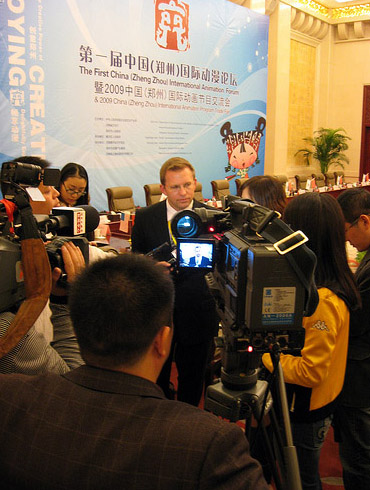
Kevin Geiger takes questions from the Chinese media.
The 2009 Zhengzhou International Animation Summit, Forum & Trade Conference was held from October 19th through October 22nd, 2009 in the city of Zhengzhou, Henan Province, China. Prominent figures in animation & media across mainland China and from around the world joined with regional and national officials from the Chinese government to celebrate animation, share ideas, and to explore opportunities for friendship and cooperation. As Foreign Liason, Mr. Geiger personally invited the following distinguished guests to participate in the Forum:
-
Clifford Coonan (Beijing Bureau Chief, Variety Magazine)
-
Marge Dean (Emmy-award-winning General Manager, Wildbrain Animation Studios)
-
Bill Dennis (Executive Director, ASIFA International)
-
Daniel Engelhardt (Development Executive, Family Entertainment, Lionsgate)
-
Wen Feng (VP of Development, Magic Dumpling Animation Studio)
-
Barry Glasser (Partner, Golden Ocean Entertainment)
-
Max Howard (President, Exodus Film Group)
-
Ken Katsumoto (Executive Vice President of Development, Family Entertainment, Lionsgate)
-
Yong Tsui Lee (SIGGRAPH Asia 2008 Conference Chair)
-
Frank Lunn (Entertainment Lawyer & Partner, Tisdale & Nicholson LLP)
-
Karen Malach (Former Executive Producer, DisneyToon Studios)
-
Peter McHugh (Manager & Producer, The Gotham Group)
-
Brian Miller (Senior Vice President, Cartoon Network)
-
John Murrah (“Bolt” Visual Effects Supervisor, Walt Disney Animation Studios)
-
Kyle Odermatt (“Princess & the Frog” Visual Effects Supervisor, Walt Disney Animation Studios)
-
Jennifer Pelphrey (Vice President of Production, Cartoon Network)
-
Gary Pudney (Director, Typhoon Distribution Ltd.)
-
Daniel Schmidt (Chief Staff Executive, SIGGRAPH Asia)
-
Mark Simon (Producer, A&S Animation Inc.)
-
Stephen Spencer (Director of Publications, ACM SIGGRAPH)
-
Shelley Surpin (Entertainment Lawyer, Animation World Network)
-
James Wang (Founder & CEO, Wang Film)
-
Barry Weiss (Executive Committee Member, Academy of Motion Picture Arts & Sciences)
-
Feidhlimidh Woods (Vice President of Creative Development, Brown Bag Films)

The official letter of invitation from the Zhengzhou 2009 organizing committee read, in part:
"...the Provincial Government of Henan in conjunction with local officials & industry leaders from the city of Zhengzhou shall convene the 2009 Zhengzhou International Animation Summit, Forum & Trade Conference from October 19th through October 22nd, 2009 in the city of Zhengzhou, Henan Province, China.
Executives, artists, specialists and entrepreneurs from the animation media industries across mainland China and around the world will meet in the heart of Henan to celebrate the art form, share ideas, and to explore opportunities for friendship and cooperation. In particular, the experience of experts from the highly developed and successful animation markets of North America, Japan and South Korea will inform the discussion of issues facing the international animation industry in general and the growth of the Chinese animation industry in particular.
The trade fair program of the 2009 Zhengzhou International Animation Summit, Forum & Trade Conference will invite creators of original animated content to present their works for the purpose of trade and distribution. The trade fair is concurrent with the Zhengzhou Animation Carnival, which will feature an animation theater, interactive games and ancillary products. Conference guests will tour the sites of the Zhengzhou Animation Industry Base and the Zhengzhou Creative Industry Park, which are hubs of present and future media enterprise..."
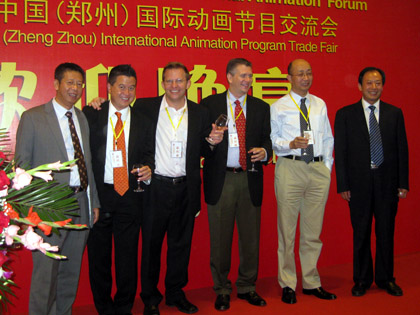
Foreign Liason Kevin Geiger joins 2009 Zhengzhou Animation Forum orchestrator & Henan animation industry leader XueBing Mao (far left) and other guests at the opening reception.

Take five: Wang Film founder James Wang, Magic Dumpling Animation Studio VP of Development Wen Feng, Kevin Geiger, Xuebing Mao, and Lionsgate EVP of Family Entertainment Ken Katsumoto pause for a snapshot.
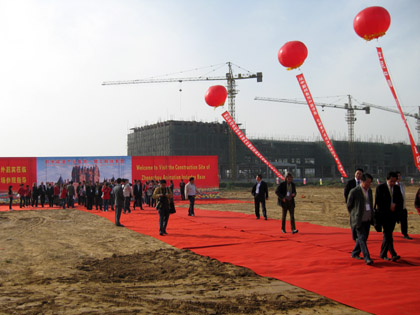
Site of the new Zhengzhou Animation Base, currently breaking ground.
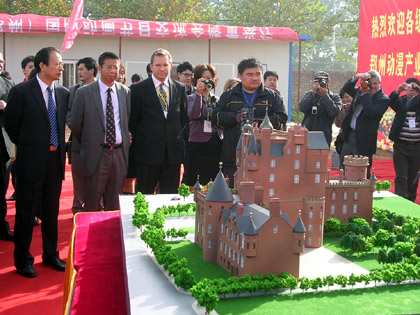
Mr. Mao and Mr. Geiger inspect a scale model during the groundbreaking ceremony.
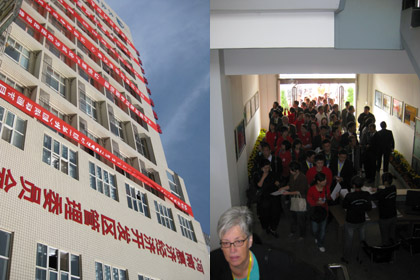
The distinguished guests, regional industry leaders and government officials tour the adjacent temporary site of the Zhengzhou Animation Base.

Mr. Geiger signs The Wall.

The Zhengzhou Daily covers Day 1 of the forum and groundbreaking.
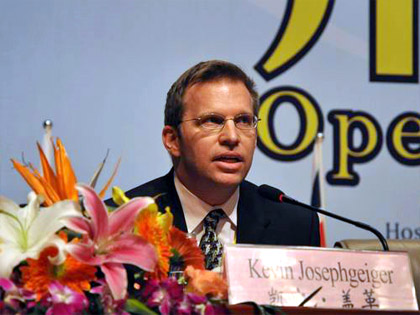
Kevin Geiger delivers the opening address of the First Zhengzhou International Animation Forum.
"It is a great honor to stand before you at the opening ceremony of the first Zhengzhou Animation Summit. As I look around, I see the most remarkable assembly of distinguished international guests, Chinese industry leaders, and government officials. I’d like to extend personal thanks to my friends in the West for making time in their incredibly complex schedules to be here with us today, and also to our friends in the East for doing the same. The initiative and support for this event, from the Ministry of Culture, and all government officials & industry leaders in Henan province and the Zhengzhou region, has been truly incredible. In particular, I must mention my good friends, the mayor of Zhengzhou and Mr. Mao XueBing, who have literally moved mountains in order to make this great day possible. The Chinese concept of guanxi, or relationships, is truly something that is understood in Hollywood, and I believe that this event marks the start of many fruitful relationships between new friends.
China is the fast-growing animation market in the world. With a total population in excess of 1.3 billion individuals, potentially 500 million people in mainland China can be identified as animation consumers. Domestic Chinese box office returns have increased 25% annually over the past five years. Due to increased international demand, Chinese motion picture distributors generated more than $2 billion RMB in global revenue during 2007 - an increase of 5.7% from the year before. In 2008, China produced 406 feature films, and the domestic Chinese box office grossed approximately $4.3 billion RMB (over $628 million USD) – a 30% increase from 2007. Of the 10 highest-grossing films on the mainland in 2008, seven were domestic productions or co-productions. China now ranks among the world’s top 25 largest box office markets for the Big Six studios of Disney, Fox, Paramount, Sony, Universal, and Warner Brothers. China also has the distinction of being the world’s third-largest stereoscopic market (after the U.S. and U.K.).
It is estimated that 11% of the Chinese animation audience is under the age of 13, with 59% between the age of 14 to 17 and 30% over 18 years of age. China has 370 million children, more than the entire population of the United States. Today, approximately 18 billion RMB (almost $2.5 billion USD) is spent by animation consumers in China, but nearly 90% of that money flows straight out of thecountry to Japan, and to a lesser extent the United States and Europe. Despite its visual proficiency, recent Chinese animation content has demonstratively lacked domestic market appeal due to an emphasis on education over entertainment. Like most children around the world, the viewing preferences of Chinese youth seem to indicate that they relate better to entertaining stories that provide avivid reflection of their feelings, problems and dreams. Rigid characters, and plot lines lacking the sense of fun and innocence that children hold so dear, are roundly ignored. Chinese animators in the 21st century face not so much a technological or artistic challenge as they do a challenge in compelling storytelling.
There are more than 3000 animation production studios in China. These include large, government-financed companies such as Shanghai Animation Film Studio, the animation division of China Central Television (CCTV), privately-financed companies focusing on work-for-hire (estimated to comprise 60% of Chinese animation business), and numerous entrepreneurs specializing in Flash animation. Relatively few of these studios are regarded as having the capacity or experience to produce original, high-quality animated features and television series. The mainland Chinese educational system is currently struggling to fill the need for skilled animation workers to meet the content demand. Other critical issues facing the contemporary Chinese animation industry in 2009 include the demands of digital technology, the challenges of global networking, the considerations of cross-cultural viewing and calls for copyright protection.
Despite this, or perhaps because of it, the mainland market is uniquely poised for an innovative and profitable future. The gross earnings of China’s animation industry across all media have already exceeded those of its live-action film industry. Building on a remarkable animation history, the Chinese animation market has grown increasingly sophisticated since the pre-Cultural Revolution days, with an appetite for content that seeks to combine Chinese cultural traditions with Hollywood story structure, for contemporary resonance. In recent years, provincial Chinese governments (such here in Henan) have rolled out substantial plans to develop the homegrown market for animation artists and companies, in keeping with the policies set forth by the central authorities. These developments follow the announcement made by Beijing's State Administration of Radio, Film and Television (SARFT) in August 2004 to launch three new national children’s networks and more than 60 broadcast stations providing an increased volume of children’s programming. 2004 was set as China’s Animation Year, and the industry generated revenue amounting to tens of millions of RMB. In light of this evolving landscape, it is no surprise that domestic animation companies and foreign co-production partners alike are eager for a place at the table. Nickelodeon recently announced that it will launch a one-hour block of Chinese animation in July 2009. In addition to the mainland, the ChinaToon program will be available to 13 territories across Southeast Asia.
Domestic box office returns as reported for Chinese animated feature films in 2008 range from $1 million RMB for The Legend of Countryside Hero, to a record-breaking $30+ million RMB for Storm Rider: Clash of Evils, over a theatrical run of 4 weeks each. Most recently, the animated feature film Pleasant Goat and Big Big Wolf, based on characters from the popular Chinese TV series, broke box office records with over 100 million RMB in mainland theatrical revenues to date in 2009. However, revenues from the domestic Chinese market alone are not sufficient to cover the costs associated with high-quality animation productions. Successful international distribution must be part of the equation. In fact, international co-production deals and distribution presales are vital to the support of Chinese feature films on the mainland.
Live-action Chinese films such as Farewell My Concubine, 2046, Hero, and House of Flying Daggers have enjoyed box office success and critical acclaim around the world. In 2000, the multi-national production Crouching Tiger, Hidden Dragon achieved massive success at the Western box office despite being dismissed by some Chinese film-goers as pandering to Western tastes. Nevertheless, it provided an introduction to Chinese cinema for many Americans and Europeans, and increased the popularity of many Chinese films that may have otherwise been unknown to Westerners. In 2002, Hero was made as a second attempt to produce a Chinese film with the international appeal of Crouching Tiger, Hidden Dragon. The film was a phenomenal success in most of Asia and topped the U.S. box office for two weeks, making enough in the U.S. alone to cover the production costs. The successes of these films blur the boundaries between mainland Chinese cinema and a more internationally-based Chinese-language cinema. The merging of talent and resources from China, Hong Kong, Taiwan and the West indicate that Chinese cinema is poised to compete with the best Hollywood films. While Chinese animation productions have yet to emulate the successful precedent of their live-action counterparts, it is only a matter of time before a Chinese animated feature enjoys breakout success on the world stage.
However, even international theatrical and broadcast success is not enough to maximize the animation industry’s profits (especially when broadcast revenues reimburse just 10% of production costs on average). In 1999, $21 million RMB (about $3 million USD) was spent to produce Lotus Lantern. The animated feature film nearly broke even at the box office, but failed to capitalize on any related ancillary products. However just two years later, the animated film Crazy for Song saw two-thirds of its profits come from the sale of related merchandise. And while the American cartoon Transformers was broadcast for free on Chinese television, subsequent profits from toy sales amounted to $5 billion RMB. Ancillary animation products occupy an increasingly large market space in China. The annual sales of related stationery products are more than $60 billion RMB (approximately $8.8 billion USD), while those of children's toys, food and clothing are more than $20 billion RMB, $35 billion RMB and $90 billion RMB respectively. The annual sales of children’s DVDs and publications in China reach only $10 billion RMB annually, no doubt affected by the high degree of piracy on the mainland. Piracy of Hollywood blockbusters is rampant in China, and also has a negative impact upon the theatrical profitability of Chinese films. The future development of these ancillary profit channels will depend upon effective regulation and enforcement at the state and provincial levels.
More than almost any other nation, the development of cinema and animation in China has been a mirror of the historical events and political developments that have shaped the mainland. Both influencing and being influenced by Hollywood, China’s film industry is a complex, crucial and continually-evolving component of the nation’s rise to prominence in the 21st century.
Henan is the historical heart of China, and Zhengzhou is the modern-day muscle behind that heartbeat. The mayor and Mr. Mao XueBing have as their goal nothing less than for the heart of China to also become the heart of animation in China. The rich historical soil of this region provides fertile ground for the seeds of these creative ambitions. With the help of our friends assembled here today, anything is possible for those who are willing to faithfully apply their brains, their hands and their hearts… to their dreams. Thank you."
- Kevin Geiger
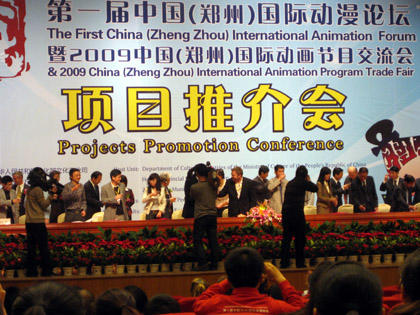
Agreements are signed with a toast to successful partnerships at the Projects Promotion Conference.
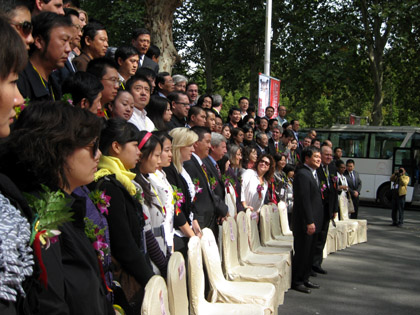
Forum guests from around the world assemble for a group photo.
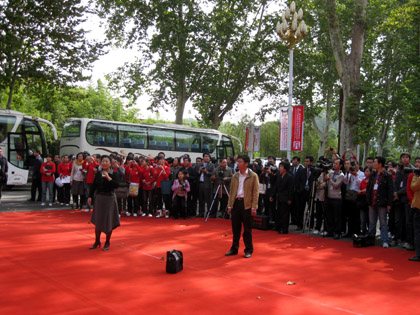
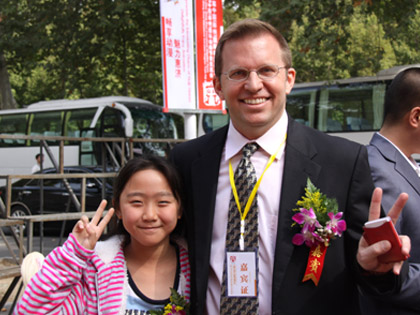
China's next generation of animator.
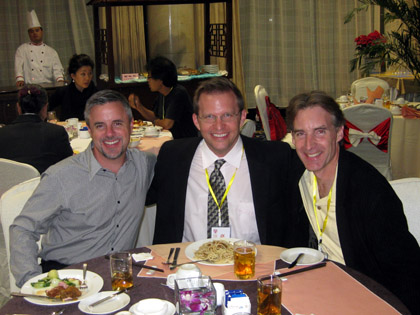
Kevin with former Disney Animation colleagues, “Princess & the Frog” Visual Effects Supervisor Kyle Odermatt and “Bolt” Visual Effects Supervisor John Murrah
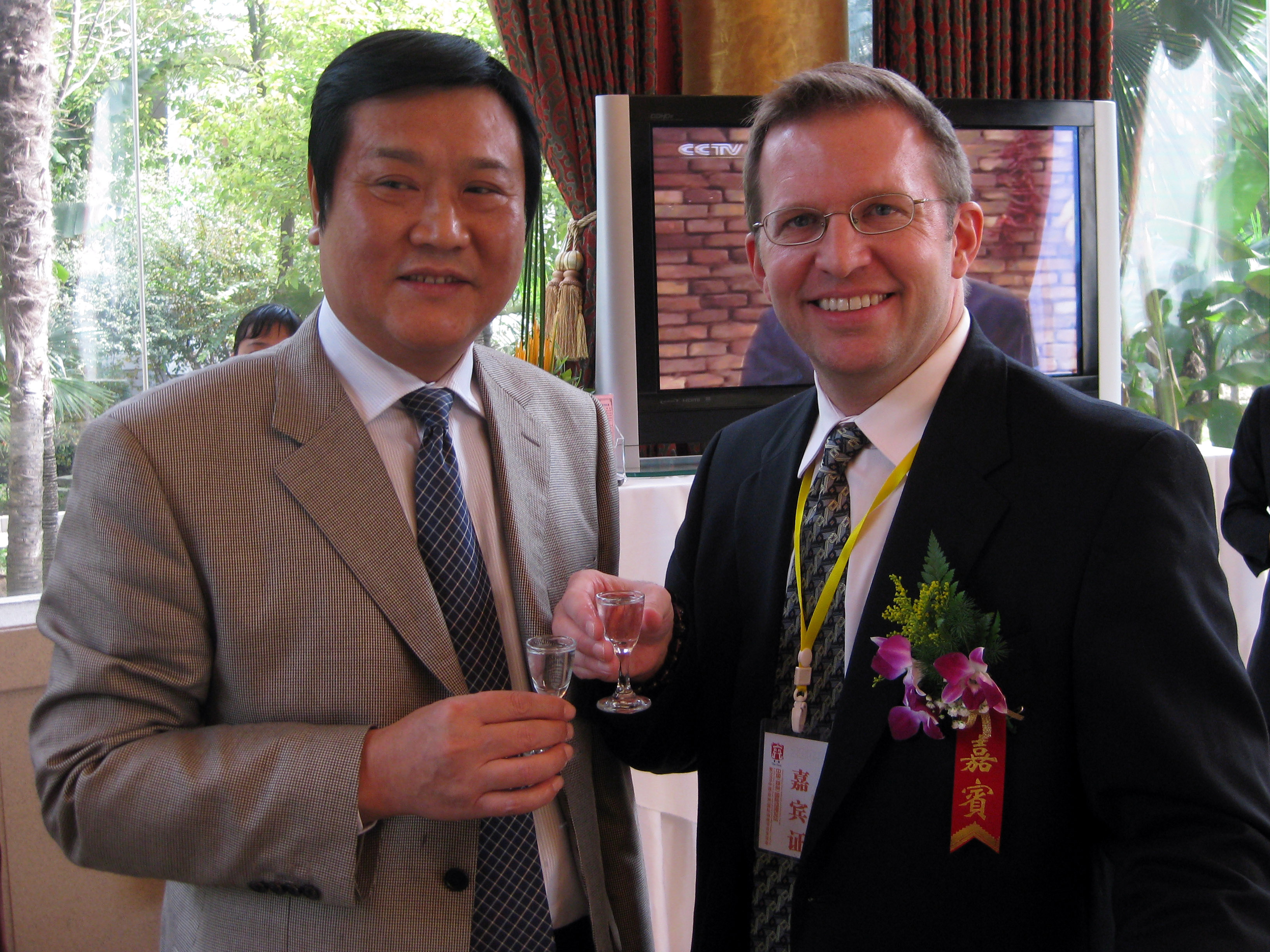
Lunch with the Mayor of Zhengzhou.
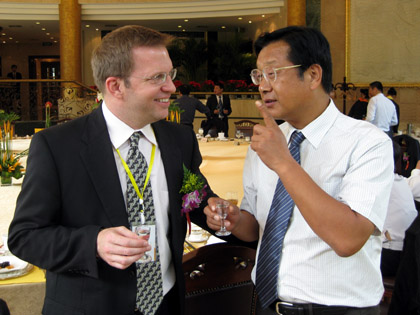
Doing business in China.
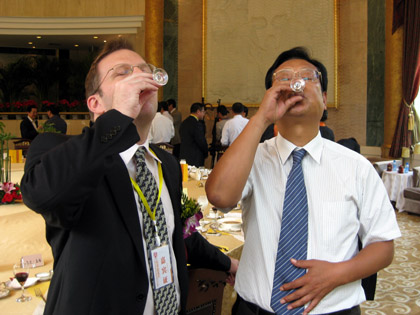
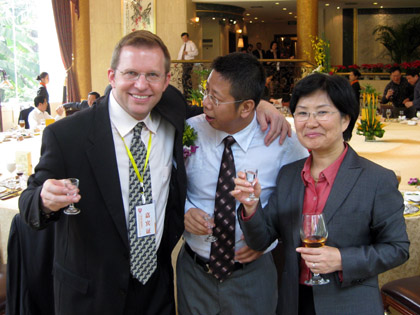
Mr. Mao checks on Kevin's progress.
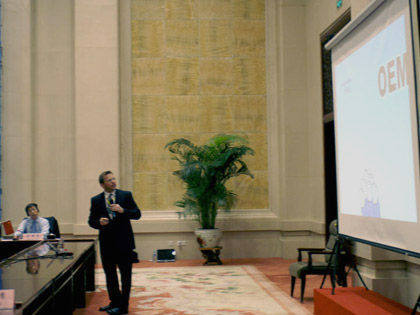
A couple hours later, Kevin delivers his keynote presentation: "OEM Serves, But IP Rules".

Kevin Geiger's keynote presentation, entitled "OEM Serves, But IP Rules", examined how insourced work can be valuable to developing animation industries, but only as a first step towards the ultimate goal: creation of original IP for animation. Mr. Geiger's keynote touched upon insourcing, the pros & cons of the government's focus upon animation bases, the value of intellectual property, the importance of character development and story development, and the global animation market.
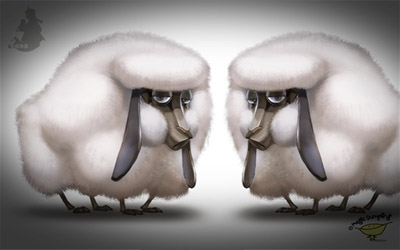
Gugu & Lulu, from Magic Dumpling Animation Studio's animated feature film "Road to Home", which Mr. Geiger is currently developing as a Producer.
Kevin described the creative development process used in his Beijing studio Magic Dumpling on projects such as "Road to Home", and also featured original content being done in Zhengzhou, such as Xuebing Mao's animated TV series, "Wine God". As Mr. Geiger said in closing, "Your buildings will never leave Chinese soil, but your ideas can set fire to the world!"
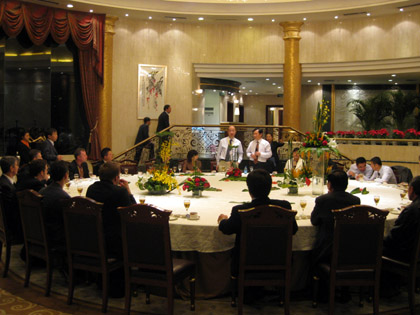
That evening, a roundtable discussion with selected forum guests and key government officials from Henan province and the Zhengzhou region.
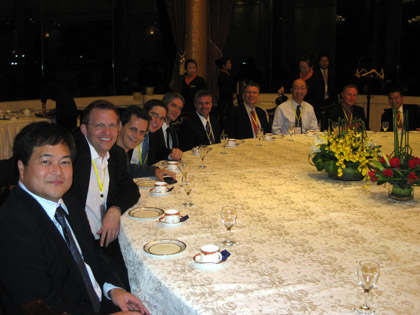
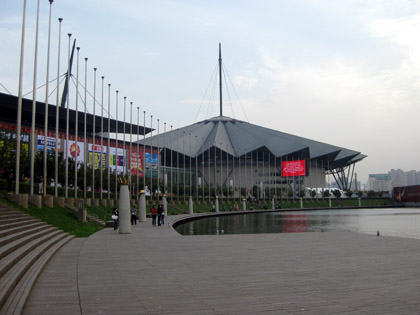
The following day, a tour of downtown Zhengzhou: including the waterfront Convention Center and the Henan Art Center.

Lionsgate's EVP of Family Entertainment, Ken Katsumoto.

Kevin with Magic Dumpling Advisory Board Member Frank Lunn, and "Road to Home" Creator and Co-director Wen Feng.

The locals put on a show.

Gotham Group's Peter McHugh keeps it real with Magic Dumpling's Wen Feng.

Monument Valley.

(photocollage courtesy Mark Simon)
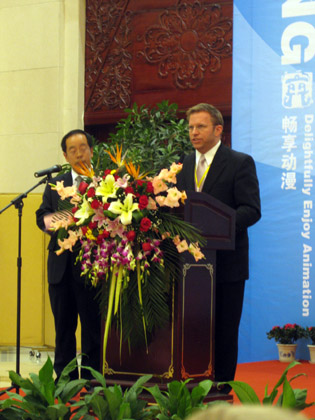
Kevin Geiger delivers the closing address at the farewell banquet.
At the farewell banquet of the 2009 Zhengzhou International Animation Summit, Forum & Trade Conference, Mr. Geiger delivered a brief closing address in which he thanked one and all for a successful conference, and announced the formation of the China Animation Business Association (CABA): with himself elected as Chairman, Mr. Xuebing Mao as Vice-Chairman, Mr. Lin Bo as Secretary, Mr. Sanwei Chan as Chinese Representative, Ms. Karen Malach as American Representative, and Mr. Feidhlimidh Woods as European Representative. The purpose of CABA is to promote further cooperation between the animation industry in China and the rest of the world.
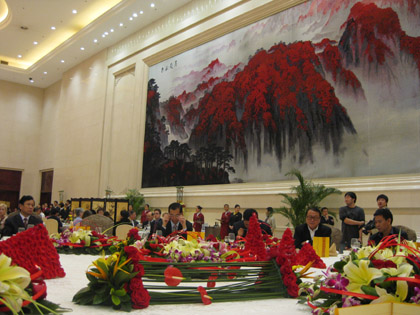
The grand reception hall.
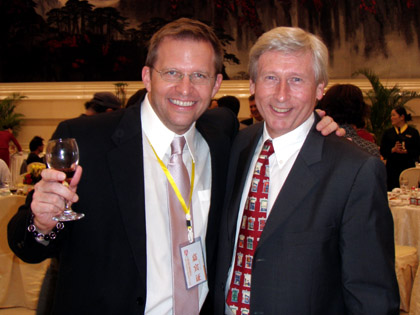
With Max Howard, President of Exodus Film Group.
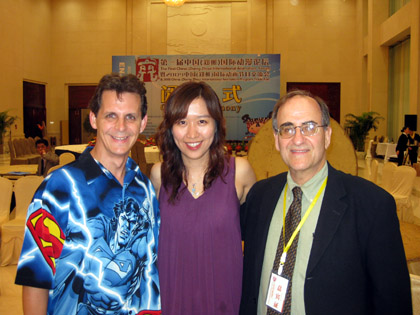
Wen Feng with Director/Producer Mark Simon and Writer/Producer Barry Glasser.
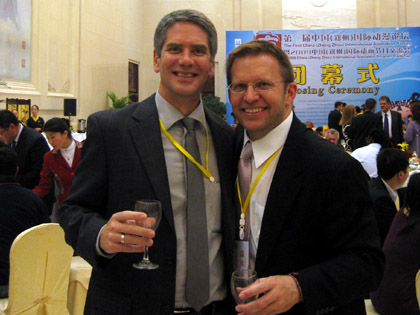
Kevin Geiger's former Ohio State University colleague, Stephen Spencer, Director of Publications at ACM SIGGRAPH.
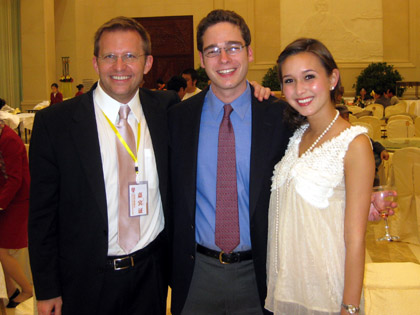
Kevin with Lionsgate's Daniel Engelhardt and friend Cordelia Ross.
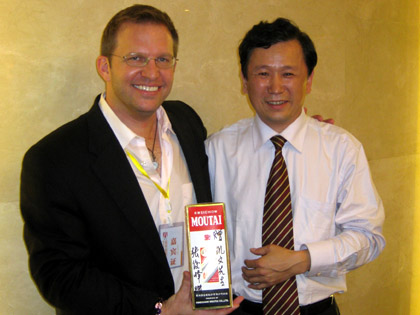
Mr. Geiger receives an autographed bottle of moutai from the Regional Party Secretary.
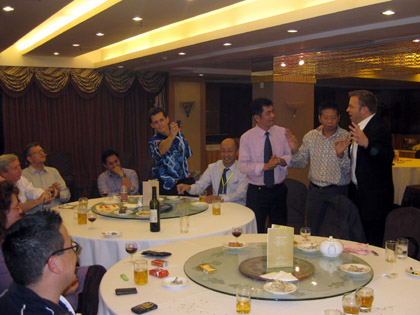
Afterparty nonsense.

A day of atonement at the Buddhist grottoes south of Luoyang City, near the Yi River.


A stupa forest.

The eaves of famed Shaolin Temple in Henan province.
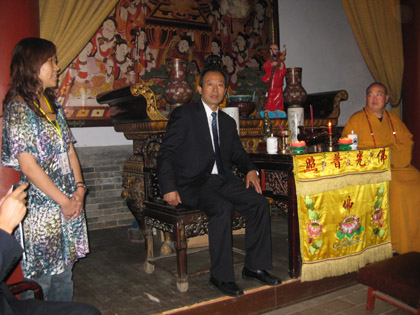
An audience with the Abbot of Shaolin Temple.

Kevin before an audience of another kind, trying to keep up with a young monk.

An indescribable outdoor performance held in the valley of two mountains.
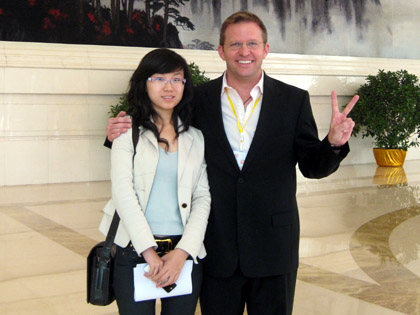
Helen, the backbone of our efforts to get everyone to and from Zhengzhou safe and sound.

The Rat Pack celebrates a successful end to the First Zhengzhou International Animation Forum.



